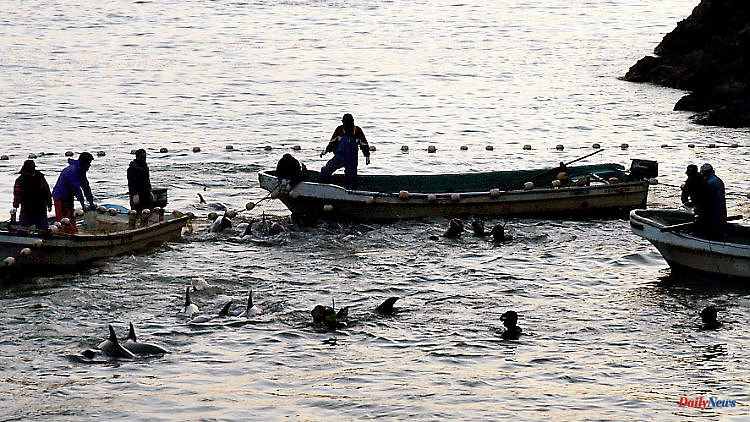Hundreds of dolphins are killed in a drive hunt in Taiji, Japan, between September and March every year. According to animal rights activists, mother animals and their young are not spared either. The marine mammals are not only hunted for their meat.
Japanese dolphin hunters have also killed mother dolphins and their young during the annual drive hunt off the coast of the whaling town of Taiji, according to environmentalists. As the Japanese non-governmental organization Life Investigation Agency (LIA) announced, groups of dolphins with nursing mothers were attacked and babies were left to their fate on the open sea. Together with other environmental and animal rights activists, the activists follow the hunt every day, which always takes place between September and March just off the coast of Taiji. The small town in Wakayama Prefecture gained notoriety as the scene of the annual carnage in the Oscar-winning documentary "The Cove".
While the number of dolphins and small whales killed in Japan has dropped significantly due to low demand for the meat, which is often contaminated with toxins, the export of live animals remains a highly lucrative business for the fishermen involved in the drive hunt, according to environmentalists. According to the LIA, at least 527 animals were killed for meat processing in the just ended hunting season, for which a catch quota of 1849 animals applied. 33 dolphins were caught alive for sale in aquariums.
"In Japan, the drive hunts for dolphins are no longer financed by the sale of dolphin meat, but by the unscrupulous demand from dolphinariums," complained Sandra Altherr from the animal and species protection organization Pro Wildlife before the start of the latest hunting season.
A trained dolphin would pay $50,000 or more. Japan sells most of the intelligent marine mammals to China. A record 280 dolphins are now being held captive in Taiji for entertainment shows and later sale following the end of the recent hunting season, the LIA reported.
Once local fishermen spot dolphins near the Taiji coast, they herd the animals into a bay. To do this, the fishermen paralyze the dolphins' sense of direction by holding metal rods in the sea and hammering them. Healthy young animals - according to animal rights activists, females are preferred - are then sorted out in cooperation with dolphin trainers on behalf of domestic and foreign dolphinaria in front of a beach in Taiji. The remaining animals are slaughtered in a neighboring bay. The fishermen repeatedly reject accusations made in western countries that the slaughter is cruel.












